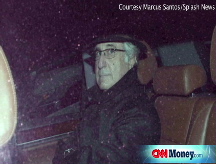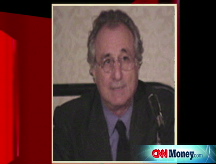Madoff tentacles ensnare exchange
One of Madoff's nieces is married to Eric Swanson, a former SEC lawyer who was key to BATS Trading winning official exchange status.
NEW YORK (Fortune) -- The tentacles of the story of Bernard Madoff, the investment manager who was arrested last week for allegedly defrauding investors out of billions of dollars, are reaching ever-deeper into the financial markets.
One of Madoff's nieces, Shana Madoff, is married to Eric Swanson, a former SEC lawyer who is now the general counsel of BATS Trading, The Wall Street Journal reports.
What is BATS Trading? Located about 20 minutes south of Kansas City on Route I-35 in a suburban office park, BATS (which stands for "better alternative trading system") is a fast-growing electronic stock exchange.
Founded three years ago, BATS has quickly become a major player: It now trades one out of every ten U.S. shares, about $35 billion of transactions, every day. In October, BATS was approved by the SEC as an official stock exchange, the first since Nasdaq began in the 1970s.
BATS hired Swanson in January 2008, in part to help win exchange status with the SEC. According to his company bio, Swanson worked at the SEC from 1996 to 2006, most recently as head of its "inspection program responsible for regulatory oversight of trading on the securities exchanges and ECNs." In the interim two years, in addition to marrying Madoff's niece in 2007, he had been a VP of regulatory strategy at Ameriprise Financial (AMP, Fortune 500), a financial services firm based in St. Paul, Minn. Swanson, who got his law degree from the Hamline University School of Law, also in St. Paul, works out of BATS' New York office, located on Wall Street across from the New York Stock Exchange.
There is no evidence of Swanson being involved in an SEC investigation of Madoff that began in 2005, but the spotlight turned on Swanson after SEC chairman Christopher Cox Tuesday cryptically referred to looking into "staff contact and relationships with the Madoff family and firm, and their impact, if any, on decisions by [SEC] staff regarding the firm."
The SEC has been roundly criticized for not discovering the Madoff fraud despite investigating the firm multiple times in the past nine years, and Cox is promising to get to the bottom of why.
A spokesman for Swanson did not immediately return a call for comment. Randy Williams, a spokesman for BATS, says: "Throughout his career, Eric has displayed the highest ethical standards and his reputation has been - and continues to be - above reproach." Talking to reporters Wednesday, Cox added: "There is no evidence thus far of any wrongdoing by any SEC professional."
Despite the connection to the Madoff story, BATS was one of the few financial companies to post a banner year in 2008 - in part because it has been a beneficiary of recent market volatility. From August to October its average volume doubled; it was the only U.S. market that didn't have to halt trading last year because of having too many sells and not enough buys. In late October, it hit a record for volume, trading 2.7 billion shares. Its high volume has made it the third-largest stock exchange in the U.S., eating into the market share of leaders Nasdaq and the New York Stock Exchange.
Why all the growth? When everyone is selling, often the only buyers are market-making firms specializing in the furious buying and selling of millions of shares to make money from tiny price changes. BATS appeals to these firms - which range from anonymous 20-person shops to subsidiaries of big banks - with software that executes trades in microseconds rather than the milli�seconds everyone else offers. (Though Madoff did have what he called a "market-making" operation, it was unaffected by his firm's collapse.)
BATS software is faster in part because it was built from scratch in the past couple of years, but also because the firm really is a technology company, not a financial firm. It draws engineering talent from a mini financial-tech corridor in the Kansas City area. Its whole market is overseen by 18 people watching a dozen Dell (DELL, Fortune 500) computer monitors.
Culturally, BATS feels a world away from Wall Street. The employees are mostly geeky, family-oriented software guys who take lunch at a long table in the office. Team building is done through once-a-month midnight bowling and WhirlyBall competitions (think polo in bumper cars).
Like many startups, BATS began as an attempt to break the control of established players, in this case Nasdaq and the NYSE. Founder Dave Cummings, a trader who previously founded market maker Tradebot, was well-known for sending out e-mail blasts complaining about the monopolist practices of Nasdaq, referring to its CEO Robert Greifeld as "Bob the Bully."
Being approved an official exchange gives BATS a boost in legitimacy, plus the right to clear its own trades - shaving ever more microseconds from the time it takes to execute a transaction. Exchange status also gives BATS a larger share of the revenue that accrues to all exchanges from the sale of market data to firms and third-party services.
BATS has plenty of significant issues to deal with. Trading volumes frequently drop after a market upheaval, as traders move money into low-risk securities like Treasurys. Competition is in the offing: Direct Edge, a rival based in New Jersey, has said it is developing its own superfast platform to go after BATS's market-making customers.
But BATS is on the move: It recently launched an electronic exchange in Europe and is considering other markets like Canada and Australia. CEO Joe Ratterman even muses about getting into the IPO business. "It doesn't have to be an old boys' club, with some secret conversation between investment bankers in their executive lunchrooms," he says. "I think that model is ready to tumble for good." ![]()
-
 The retail giant tops the Fortune 500 for the second year in a row. Who else made the list? More
The retail giant tops the Fortune 500 for the second year in a row. Who else made the list? More -
 This group of companies is all about social networking to connect with their customers. More
This group of companies is all about social networking to connect with their customers. More -
 The fight over the cholesterol medication is keeping a generic version from hitting the market. More
The fight over the cholesterol medication is keeping a generic version from hitting the market. More -
 Bin Laden may be dead, but the terrorist group he led doesn't need his money. More
Bin Laden may be dead, but the terrorist group he led doesn't need his money. More -
 U.S. real estate might be a mess, but in other parts of the world, home prices are jumping. More
U.S. real estate might be a mess, but in other parts of the world, home prices are jumping. More -
 Libya's output is a fraction of global production, but it's crucial to the nation's economy. More
Libya's output is a fraction of global production, but it's crucial to the nation's economy. More -
 Once rates start to rise, things could get ugly fast for our neighbors to the north. More
Once rates start to rise, things could get ugly fast for our neighbors to the north. More









